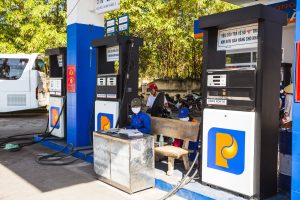Vietnam’s government yesterday called on its largest fuel trading firms to release their stocks to the market amid dwindling supplies at petrol stations in the country’s two largest conurbations.
The shortages date back several weeks, though they have begun to bite more in recent days. According to local media reports, petrol stations in Ho Chi Minh City and the capital Hanoi and their surrounding regions have shut or limited sales this week, with retailers citing financial difficulties and constrained domestic supplies.
“Petroleum products are an indispensable source of energy for the economy…and therefore leading fuel trading firms have to keep the supply from being disrupted,” Minister of Industry and Trade Nguyen Hong Dien said in a statement that Reuters reported.
Yesterday, the news outlet VnExpress reported that petrol stations in Hanoi put up signs stating that they were “out of gasoline,” while 108 of 550 petrol stations in Ho Chi Minh City, or nearly 20 percent of the total, were recording an inventory shortage. Some limited sales to a small amount, while others only sold to motorbikes.
There seem to be several reasons for the shortages, part of which is a simple mismatch between supply and demand. On October 31, Petrolimex, Vietnam’s top importer of fuel, issued a statement claiming that “the demand for petroleum in the region has increased amid a pandemic recovery, pushing demand to exceed supplies, resulting in shortages and higher prices.”
But the exact reasons for the supply shortage remain unclear. Late last week, Dien denied that Vietnam was facing an overall shortage and blamed the dry pumps on fluctuations in the foreign exchange rate and the difficulties that some fuel importers have faced in accessing credit from banks.
“The domestic fuel market has been stable, without any shortage, while prices are comparatively lower than elsewhere in the region,” he said. Dien added that the country had ample fuel stocks, totaling some 3 million cubic meters, which were sufficient to meet domestic demand until the end of November, and that domestic refineries, which supply between 70 and 80 percent of the country’s fuel needs, were running at capacity.
But several additional factors seem to be exacerbating the supply squeeze. According to VnExpress, the Ho Chi Minh City Industry and Trade Department ascribed the city’s shortages to the suspension of major suppliers due to “tax debts and insufficient equipment.” For instance, Nam Song Hau and Xuyen Viet Oil, two major southern exporters, were banned from importing fuel in the July-September quarter. Partly as a result, it reported that petrol imports that quarter fell by 40 percent from the previous quarter, and that only 19 out of 33 suppliers imported gasoline.
As a result, unlike in neighboring Laos, where recent fuel shortages have reflected the country’s plummeting currency and scant foreign reserves, the situation in Vietnam appears somewhat more stable. Assuming that the necessary supply exists, as the minister said last week, it should be a question not of if but of when, and how quickly, the authorities can speed it to the market.

































